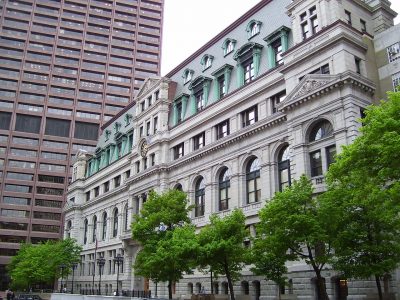Some Massachusetts prisoners will be eligible for release from state custody in order to curb the spread of COVID-19 in correctional facilities, according to a new ruling by the Massachusetts Supreme Judicial Court.

The ruling states that any individual who is currently awaiting trial, or held on technical probation or parole violation, is entitled to a “rebuttable presumption of release,” provided that they are not charged with an excluded offense. The list of excluded offenses includes various crimes of violence and drug trafficking over a certain rate.
Individuals who are being held post-conviction are also eligible for release if a motion for a new trial or to vacate the plea is filed.
The prison environment, where close-proximity group confinement makes social distancing virtually impossible, presents heightened risks of rapid spread should anybody within the facility contract the novel coronavirus. An example of such are the three inmates at the Massachusetts Treatment Center, located at Bridgewater, who have died of the disease.
The virus is most likely to be brought in by infected correctional officers who do not exhibit symptoms, as visitation has been suspended. According to the ruling, new inmates and detainees also are screened for symptoms, and those with symptoms are isolated while “those without symptoms are still quarantined for fourteen days.”
Although the ruling excludes criminals charged with a range of violent offenses, some violent criminals, like those serving a prison term for violating their probation, are still eligible for release, according to Victoria Kelleher, president of the Massachusetts Association of Criminal Defense Lawyers.
“There may still be situations where you have somebody who’s been charged with a violent crime, but they may be 60 [years old], or they may be medically vulnerable,” Kelleher said. “And so individual lawyers can still bring motions to revisit those bails and those conditions according to this order. The court will have to consider those conditions in any motion to revisit bail.”
Among the released is Glenn Christie, who was convicted of child rape and incarcerated at the Massachusetts Treatment Center for violating the conditions of his probation. Christie was put on a 10-year period of probation after being imprisoned for repeated rape of a 12-year-old boy. After Christie’s roommate at MTC died of COVID-19, Christie was released on the grounds of health risks.
However, it is unlikely alleged violent criminals will be released prior to trial. While perpetrators of non-violent crimes may not be held immediately, they will still be prosecuted.
The Supreme Judicial Court has indicated that judges need to take into account the changed circumstances when deciding whether or not to release an inmate or detainee. The ruling was a response to the emergency petition filed by the MACDL, the Public Defender Agency of Massachusetts and the American Civil Liberties Union of Massachusetts.
It argued that failure to release incarcerated individuals, given the high risk of illness and death, would constitute cruel and unusual punishment, and holding pretrial detainees would violate due process protections, which would be unconstitutional.
Kelleher said one of the factors that judges will look into when considering a release is the individual’s risk of flight.
“If from looking at their record, they have a long history of failing to appear for court, that’s something that the judge can consider in determining whether or not they’re going to release somebody,” Kelleher said, “even under these circumstances.”
Robert McGovern, communications director for the Committee for Public Counsel Services, said there has been a general overestimation of the number of individuals who will actually be released under the ruling.
“I can see maybe dozens of people over a period of time,” McGovern said. “But it’s certainly not thousands upon thousands of people like others were saying.”
McGovern said that the process is still in its early stages. Attorneys at the CPCS are currently identifying people who are eligible for the rebuttable presumption of release. These cases proceed either by coming to an agreement with prosecutors or bringing the case before a judge.
“There are cases where there’s no rebuttable presumption and we’re looking at how to try to argue those cases one by one to try to get people out,” McGovern said, “if we feel that they need to get out.”
According to Boston Municipal Court Standing Order 5-20, all hearings will be conducted remotely and be recorded. Additionally, should a released person violate the conditions of release or commit another criminal act after release, any judge may issue a warrant for arrest.
Prisoners and detainees have the power to decide for themselves whether they would rather be released or stay in prison, and this preference will differ on an individual basis. Opponents of the ruling, including seven district attorneys, have expressed concern that prisoners and detainees will be at greater risk if they are released and would no longer have access to medical help, especially if they are medically vulnerable.
Kelleher, however, said there are resources outside of the prison system for those who are released.
“We do have a team of social workers who are set up to assist people,” Kelleher said. “If we’re talking about somebody who’s got issues around housing or poverty more generally, or mental health or addiction, we have all those services set up for people that will need them.”





























































































































Carmen • Apr 9, 2020 at 12:11 am
Cool article. Keep up the good work on Corona reporting!